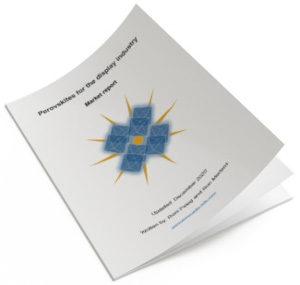Perovskites are materials that share a crystal structure similar to the mineral called perovskite, which consists of calcium titanium oxide (CaTiO3).
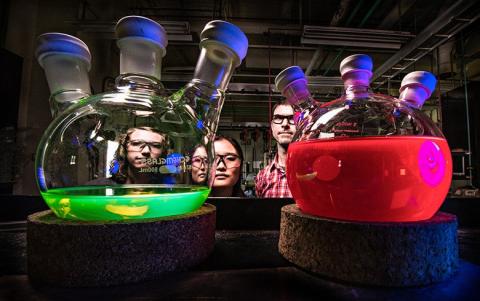
Depending on which atoms/molecules are used in the structure, perovskites can possess an impressive array of interesting properties including superconductivity, ferroelectricity, charge ordering, spin dependent transport and much more. Perovskites therefore hold exciting opportunities for physicists, chemists and material scientists.
Quantum dots (QDs), sometimes referred to as semiconducting nanocrystals (NCs), are miniscule particles of a semiconducting material with diameters in the range of 2-10 nanometers (10-50 atoms). Quantum dots have properties labeled as intermediate between bulk semiconductors and discrete atoms or molecules. Their optoelectronic properties change as a function of both size and shape. QDs demonstrate optical and electronic properties different from those of larger particles. In fact, QDs tend to exhibit quantum size effects in their optical and electronic properties, like tunable and efficient photoluminescence (PL), with narrow emission and photochemical stability. This is why QDs have been incorporated as active elements in a wide variety of devices and applications, some of which are already commercially available, such as QD-based displays.
Perovskite quantum dots (PQDs) are a class of quantum dots based on perovskite materials. While these are relatively new, they have already been shown to have properties matching or surpassing those of the metal chalcogenide QDs: they are more tolerant to defects and have excellent photoluminescence quantum yields and high colour purity. Such attractive properties are extremely suited for electronic and optoelectronic applications and so perovskite quantum dots have significant potential for real world applications, some of which are already emerging, including LED displays and quantum dot solar cells.
The latest Perovskite QD news:
New ‘self-driving’ lab developed to advance the understanding of metal halide perovskites
Researchers from North Carolina State University and the University at Buffalo have developed a 'self-driving lab' that uses artificial intelligence (AI) and fluidic systems to advance the understanding of metal halide perovskite (MHP) nanocrystals. This self-driving lab can also be used to investigate other semiconductor and metallic nanomaterials.
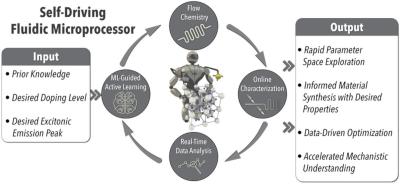
'We've created a self-driving laboratory that can be used to advance both fundamental nanoscience and applied engineering,' says Milad Abolhasani, corresponding author of a paper on the work and an associate professor of chemical and bimolecular engineering at NC State.
Researchers use quantum dots to boost perovskite solar cell efficiency & scalability
Researchers at EPFL, Zurich University of Applied Sciences, Ulsan National Institute of Science and Technology, University of Ulsan and Uppsala University have designed an innovative way to increase the performance of perovskite solar cells and maintain it at a high level even at large scales. The new approach replaces the electron-transport layer with a thin layer of quantum dots.
With this new approach, the team, led by Professor Michael Grätzel at EPFL and Dr Dong Suk Kim at the Korea Institute of Energy Research, addressed one of the major obstacles facing the commercialization of perovskite solar cells - the fact that their power-conversion efficiency and operational stability drop as they scale up, making it a challenge to maintain high performance in a complete solar cell.
DSCC: perovskite-based QD films for LCD applications could enter the market in 2022
Display market research firm DSCC says that perovskite-based QD films for LCD display applications could enter the market in 2022. DSCC says that perovskite materials could increase efficiency and color gamut compared to current solutions.
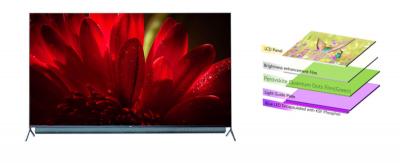
Last year we reported that Zhijing Nanoech has concluded a successful pilot with TCL, which has produced 500 75-inch QD-enhanced LCD TVs with Zhijing's PQDF films. The company hopes to achieve a design win with TCL for mass production.
The Perovskite for Displays Market Report updated to January 2022
Perovskite-Info is proud to announce an update to our Perovskite for the Display Industry Market Report. This market report, brought to you by the world's leading perovskite and OLED industry experts, is a comprehensive guide to next-generation perovskite-based solutions for the display industry that enable efficient, low cost and high-quality display devices. The report is now updated to January 2022.
Reading this report, you'll learn all about:
- Perovskite materials and their properties
- Perovskite applications in the display industry
- Perovskite QDs for color conversion
- Prominent perovskite display related research activities
The report also provides a list of perovskite display companies, datasheets and brochures of pQD film solutions, an introduction to perovskite materials and processes, an introduction to emerging display technologies and more.
The Perovskite for Displays Market Report updated to October 2021
Perovskite-Info is proud to announce an update to our Perovskite for the Display Industry Market Report. This market report, brought to you by the world's leading perovskite and OLED industry experts, is a comprehensive guide to next-generation perovskite-based solutions for the display industry that enable efficient, low cost and high-quality display devices. The report is now updated to October 2021.
Reading this report, you'll learn all about:
- Perovskite materials and their properties
- Perovskite applications in the display industry
- Perovskite QDs for color conversion
- Prominent perovskite display related research activities
The report also provides a list of perovskite display companies, datasheets and brochures of pQD film solutions, an introduction to perovskite materials and processes, an introduction to emerging display technologies and more.
Ergis develops customizable high-performance pQD barrier films
Last year, Poland-based Ergis Group launched an OLED encapsulation film platform called Ergis noDiffusion®. The company is currently testing its film solutions at customer sites in Asia, the EU and the US, and it is now starting to offer the same platform for the protection of quantum dot films, including perovskite-based QDs for use in display and lighting applications.
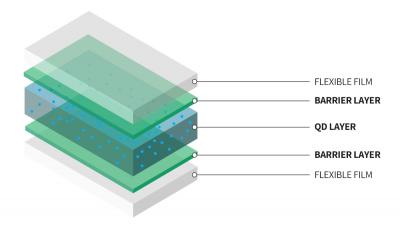
These new films can be tuned to fit specific needs. Ergis can deploy its films on several substrate types, with varying film thickness, and the barrier properties can be tuned to be between 10-6 to 10-3. This means that custom films can be created to suit the specific sensitivity of the pQDs for water vapor and to achieve specific product lifetime or other required properties.
Perovskites enable novel light-emitting memory devices
Researchers from National Taiwan Normal University and Kyushu University have developed a new memory device, readable through both electrical and optical methods, that needs only perovskites to simultaneously store and visually transmit data.
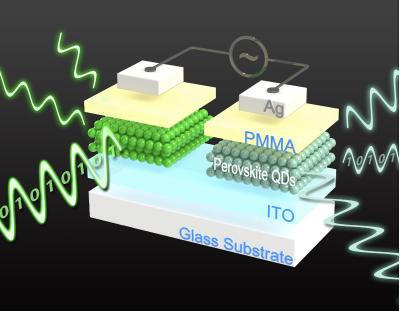 Schematic of the CsPbBr3 QD-based LEM device. Image from Nature Communications
Schematic of the CsPbBr3 QD-based LEM device. Image from Nature Communications
By integrating a light-emitting electrochemical cell with a resistive random-access memory that are both based on perovskite, the team achieved parallel and synchronous reading of data both electrically and optically in a 'light-emitting memory.'
Tip-induced strain engineering of single metal halide perovskite quantum dots
A joint research team, affiliated with Korea's UNIST, has developed a novel method capable of controlling the brightness and wavelength of quantum dots (QDs). The work was led by Professor Kyoung-Duck Park in the Department of Physics at UNIST, in collaboration with Professor Sohee Jeong in the Department of Energy Science from Sungkyunkwan University (SKKU).
The research team demonstrated the tip-induced dynamic control of strain, bandgap, and quantum yield of single CsPbBrxI3'x pQDs by using a controllable plasmonic nanocavity combined with tip-enhanced photoluminescence (TEPL) spectroscopy.
DARPA seeking research proposals for QDs and perovskite based X-ray technology
The U.S. Defense Advanced Research Projects Agency (DARPA) is currently seeking research proposals for the development of x-ray technology capable of what the agency calls "extreme photo imaging."
As part of its Extreme Photon Imaging Capability - Hard X-Ray (EPIC-HXR) project, DARPA said it is looking to develop uncooled hard x-ray imagers based on advanced nanocrystalline materials with high spatial and energy resolution, including quantum dot and perovskite materials.
The Perovskite for Displays Market Report updated to July 2021
Perovskite-Info is proud to announce an update to our Perovskite for the Display Industry Market Report. This market report, brought to you by the world's leading perovskite and OLED industry experts, is a comprehensive guide to next-generation perovskite-based solutions for the display industry that enable efficient, low cost and high-quality display devices. The report is now updated to July 2021.
Reading this report, you'll learn all about:
- Perovskite materials and their properties
- Perovskite applications in the display industry
- Perovskite QDs for color conversion
- Prominent perovskite display related research activities
The report also provides a list of perovskite display companies, datasheets and brochures of pQD film solutions, an introduction to perovskite materials and processes, an introduction to emerging display technologies and more.
Pagination
- Previous page
- Page 4
- Next page
